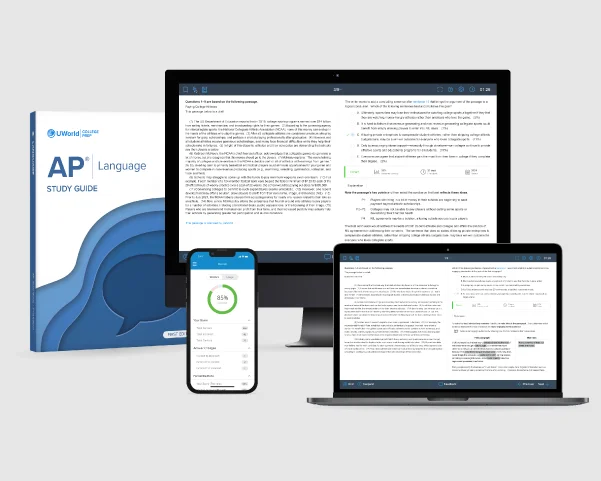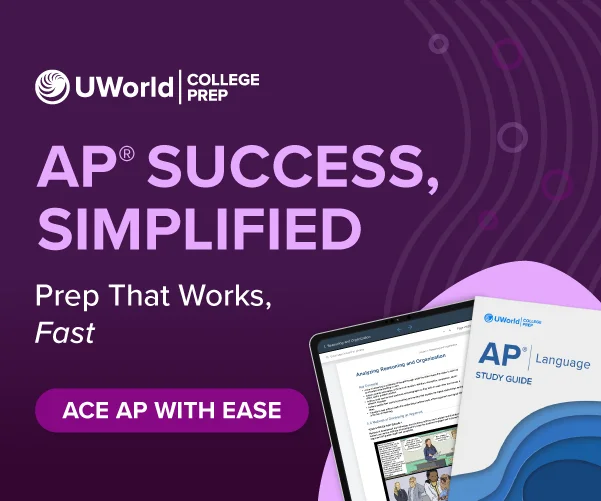Self-studying AP English Language and Composition can be a daunting task. However, with UWorld's comprehensive resources and a structured approach, you can master the art of rhetorical analysis, argumentation, and effective writing. This guide will walk you through how to leverage UWorld's study guide, video lessons, and practice questions to build a strong foundation, develop critical thinking skills, and ultimately ace the exam.
Step 1: Build a Strong Foundation with UWorld’s AP English Language Study Guide
Beginning your study with a solid understanding of the basics is crucial for AP English Language. UWorld’s AP English Language study guide is specifically designed to make foundational learning accessible and enjoyable, offering visually rich, easy-to-understand content.
-
Engaging Visuals and Up-to-Date Content:
The study guide uses well-placed visuals, examples, and explanations to bring complex rhetorical concepts to life, helping you see how elements like tone, diction, and syntax work together in effective writing. With its current, exam-aligned content, you can trust that the guide is covering what you’ll encounter on test day. -
Organized for Clarity and Comprehension:
AP English Language covers various topics, from rhetorical analysis to constructing well-supported arguments. UWorld’s study guide is arranged logically, starting with core concepts and advancing toward more sophisticated topics. This step-by-step approach makes learning manageable and prevents confusion. -
Available in Digital and Physical Formats:
Whether you prefer to study on a tablet or with a book in hand, UWorld’s study guide is available in both formats, allowing you to switch seamlessly between digital and physical formats based on convenience. The flexibility helps keep your study routine consistent, no matter where you are. -
Comprehensive Yet Approachable:
The guide is thorough without being overwhelming, providing focused information that helps you grasp the main points. This ensures that you have a strong foundation before diving into the more nuanced aspects of the exam.
Step 2: Deepen Your Understanding with UWorld’s Video Lessons
Once you have a foundational understanding, you may find certain topics challenging, such as rhetorical strategies or analysis techniques. UWorld’s videos are an excellent resource for these complex areas, breaking them down into concise, student-friendly lessons.
-
Concise, Focused Videos on Key Topics:
Each video addresses a single concept in manageable segments, allowing you to focus on one area at a time. If a particular concept is difficult, you can rewatch the video at your own pace until you feel comfortable with it. -
Visually Engaging Content:
UWorld’s videos use animations, diagrams, and examples to bring AP English Language concepts to life. This is especially helpful for visual learners, as it provides a clear picture of rhetorical elements and argument structures, making abstract ideas more concrete. -
Expert Instructors Make Learning Clear and Accessible:
Each video is guided by knowledgeable instructors who present challenging concepts in a way that’s easy to understand. The conversational tone feels like one-on-one tutoring, providing insights and tips that deepen your understanding of difficult topics.
Step 3: Test Your Knowledge with UWorld’s Practice Questions
Once you feel comfortable with foundational concepts and have reviewed challenging topics through video lessons, it’s time to put your skills to the test. UWorld’s AP English Language practice questions reflect the rigor and format of the actual AP exam, offering an invaluable way to prepare for exam day.
-
Exam-Level Practice for Realistic Preparation:
UWorld’s practice questions mirror the types of questions you’ll face on the AP English Language exam, including multiple-choice questions and rhetorical analysis. Practicing with these questions helps familiarize you with the question format, building your confidence and preparing you for real-world exam conditions. -
Detailed Explanations for Each Answer:
Each question is accompanied by a thorough explanation, outlining why one answer is correct and why the other options are incorrect. This feedback helps you understand the nuances of each question, improving your reasoning skills and highlighting areas where you might need additional practice. -
Review and Adjust Your Study Based on Performance:
After each set of questions, you can review your answers to see where you need improvement. Use these insights to adjust your study approach, revisiting any topics that need more focus to ensure you’re fully prepared.
Step 4: Reinforce Learning with Custom Flashcards and Notes
Without the structure of a classroom, independent study requires strategies for retaining and reviewing what you’ve learned. Custom notes and flashcards can be essential for reinforcing knowledge and ensuring you have a quick reference for future review.
-
Create Digital Flashcards for Key Terms and Concepts:
Digital tools like Anki, Quizlet, or UWorld’s flashcard feature allow you to create custom cards for rhetorical terms, strategies, and examples of literary devices. Reviewing these flashcards regularly helps reinforce memory and allows for quick recall of essential terms during practice. -
Summarize and Synthesize Information in Your Own Words:
After each lesson, summarize what you’ve learned in your own words. This not only reinforces understanding but also provides you with a valuable resource for final review. Organize your notes by topic, and highlight areas you want to revisit. -
Review Consistently to Retain Information:
Spend a few minutes each day or week going over your notes and flashcards. This regular review will keep key concepts fresh in your mind, making it easier to recall information when it’s time for the actual exam.
Tips for Staying Accountable and Motivated During Self-Study
Self-studying AP English Language requires discipline and organization, especially without the structure of a classroom or teacher. Here are some strategies to help you stay motivated and accountable throughout your preparation:
-
Set Clear, Achievable Goals:
Break down your study plan into smaller, manageable tasks, like completing a chapter each week or answering a certain number of practice questions. Achieving these small goals will give you a sense of progress and motivate you to keep going. -
Track Your Progress with a Planner:
Use a digital or physical planner to log your study sessions, track topics you’ve covered, and note practice question scores. Seeing your progress can be a powerful motivator, giving you a visual reminder of your hard work. -
Reward Yourself for Milestones:
Self-study can be demanding, so reward yourself for reaching important milestones. Whether it’s finishing a challenging chapter or scoring well on practice questions, celebrate your progress to stay motivated. -
Connect with an Online Community:
While self-studying can feel isolating, online communities dedicated to AP English Language can provide support and camaraderie. Joining a study group or participating in a forum allows you to ask questions, exchange ideas, and gain encouragement from others preparing for the same exam.
Conclusion
Self-studying for AP English Language and Composition can be challenging, but with UWorld’s structured resources and a strategic approach, it’s absolutely achievable. Start by building a foundation with the study guide, tackle complex topics with video explanations, and test your knowledge with exam-like practice questions. Reinforce your learning through personalized flashcards and notes to ensure long-term retention and readiness for the exam.
Self-study requires discipline, but with organization, the right tools, and a commitment to consistency, you can confidently prepare for AP English Language independently. Embrace the journey of self-study, and you’ll discover that with patience and perseverance, success is well within reach. Good luck!




